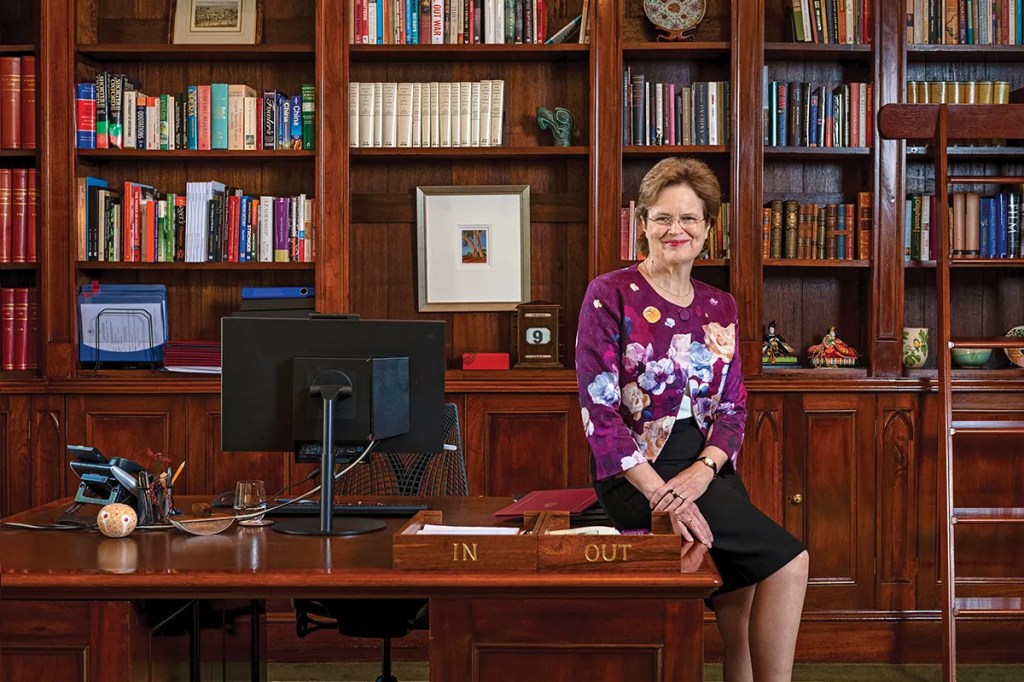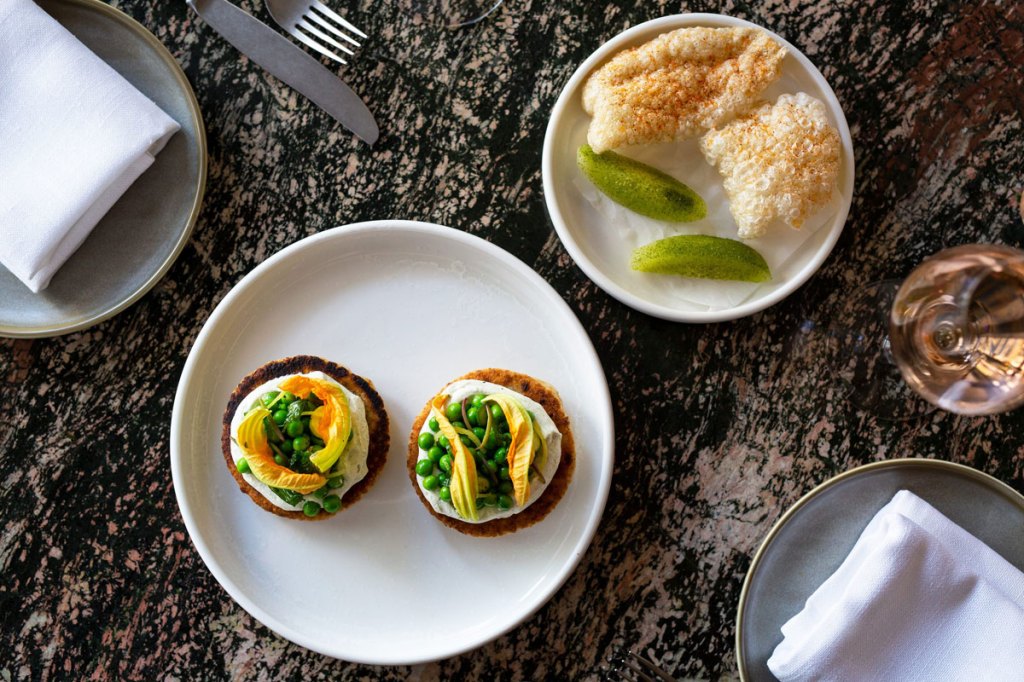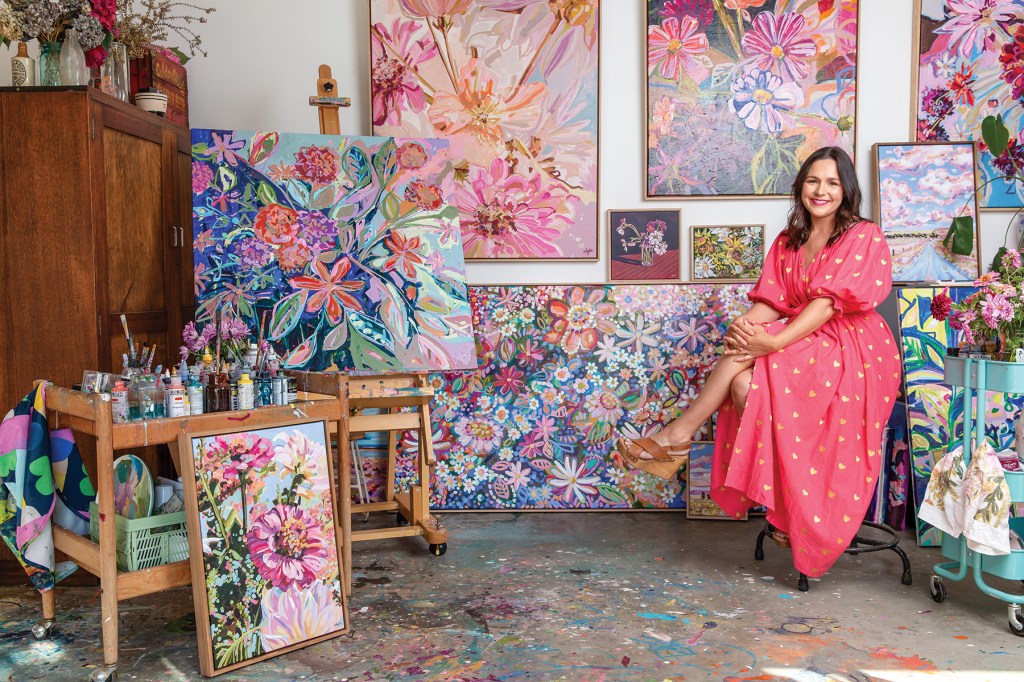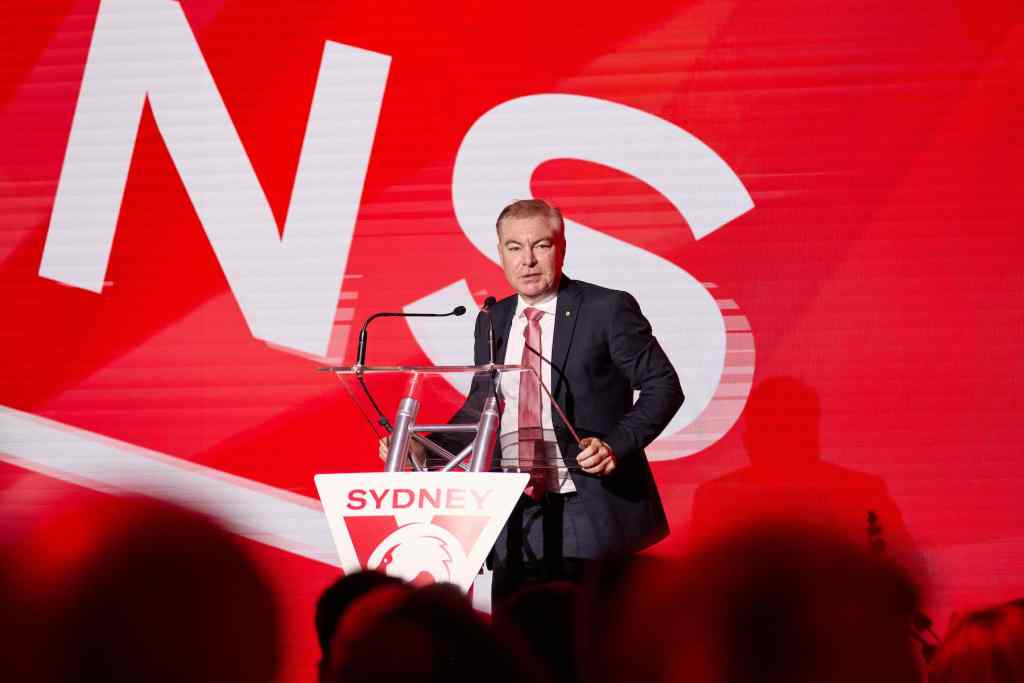At home with SA Governor General Frances Adamson AC

Her Excellency The Honourable Frances Adamson AC welcomed SALIFE into Government House to chat about her remarkable diplomatic career, family life and the joys of going from global to grass roots back home in South Australia.
An early sign that Frances Jennifer Adamson was destined to lead occurred in 1984 when the young economics student became the first ever female captain of the Adelaide University Rowing Club. Just like that, the young trailblazer smashed more than 100 years of male-dominated club history.
“I suppose I’ve always enjoyed a challenge,” she says humbly. “You get involved in the club and realise it’s a student club and everyone’s got to do something, well not everyone but your elected committee.
“We look back on it with 21st century eyes and think, ‘why did that take so long?’, but someone’s always got to be the first and I think there have been another four or five since, and now I think they have both male and female club captains.”
Today, as the 36th Governor of South Australia and known as Her Excellency The Honourable Frances Adamson AC, this remarkable leader resides at Government House, just metres away from that university rowing club.
The path from rowing captain to vice regal representative has been forged over more than four decades of service and advocacy as one of Australia’s most respected public servants and diplomats.
The 62-year-old is chatting with SALIFE in the opulent Queen Elizabeth II Room in Government House, surrounded by framed photographs of herself shaking hands with famous world leaders – Barack Obama, Xi Jinping, Narendra Modi, Donald Trump, Angela Merkel and the newly crowned King Charles III, of course.
Each photograph gives an insight into the heights of power and influence this former diplomat has achieved over an astounding global career.
Frances’s life of service began in Canberra in 1985 when she was accepted into the Department of Foreign Affairs as a trainee diplomat.
She had been to Canberra as a final year economics student under a government program called Economists in Action and seen there the “amazing work being done by brilliant people”, and was keen to get involved.

Shaking hands with President Xi Jinping watched on by former Australian Prime Minister Tony Abbott.
“I was one of 26 trainees and it was the first year in which there were more women than men, and that was because of the passage of the Sex Discrimination Act the year before, which changed recruitment practices,” she says.
So began a distinguished career where one prestigious posting led to the next.
From Canberra, Frances was appointed Vice Consul at the Australian Consulate-General in Hong Kong from 1987-90, then after a year back in Canberra, a maternity leave break, and a short-term assignment at the Australian Mission to the United Nations in New York. Then four and a half years as a political counsellor at the Australian High Commission in London.
A stint back in Canberra followed, then a posting to Taipei where she headed up the Australian Commerce and Industry Office for three and a half years.
A natural and confident leader, other high-profile leadership roles soon followed including Australia’s Deputy High Commissioner in London (2005-08), chief of staff to then Minister for Foreign Affairs Stephen Smith (2009-10), Australian Ambassador to the People’s Republic of China (2011-15), and foreign policy advisor to then-Prime Minister Malcolm Turnbull (2016).
Not a bad resume for someone who admits she never really had a game plan when it came to her career.
“I’ve never brought that kind of future planning into the present because it can be a distraction from what you’re actually doing,” she says.
During her time as Australia’s Ambassador to China – the first woman appointed to the role – the China-Australia Free Trade Agreement was being negotiated and Frances was credited with nurturing Australia’s political and diplomatic relations.
“(China’s President) Xi Jinping was quite impressive,” she says. “I’ve probably met him on 10 occasions including accompanying him on his 2014 state visit to Australia and I think he’s certainly demonstrated a deep knowledge and fondness for Australia and the Australian people at various times since I first met him in 2009 with Stephen Smith.
You might like

During her career, Frances twice served at the Australian Mission to the United Nations.
“I’m also very conscious, I suppose, that he’s seen his mission as sort of restoring a great Chinese nation to its proper place in the world and that’s, from time to time, created some differences between (our governments) when it comes to important points of principle.”
Beyond the power, pomp and protocol, Frances is down to earth and personable. It’s clear that years of diplomacy at the highest levels have honed her ability, and necessity, to really listen and be present.
“I’ve certainly learned things tend to work out better if you genuinely listen to people,” she says. “There’s hearing what people say but there’s trying to interpret it and understand what is really an issue.”
These listening and analysing skills were instilled around the dinner table during Frances’s childhood. She grew up in Adelaide with parents Jennifer and Ian, and younger siblings, Christine, a judge of the NSW Court of Appeal, and Stuart, Associate Dean of Chaplaincy and Spiritual Care at Morling College in Sydney.
“For evening meals, there’d always be a proper meal at the table with proper discussion, and we’d help prepare, scraping carrots and stringing beans and later helping with the dishes,” Frances says.
“But those dinner table conversations … were really the centrepiece of the household and what was going on and you learnt how to conduct a conversation, how to not speak over each other. It was also a genuine opportunity to test ideas and to be listened to by our parents with interest and encouragement.”
It was a comfortable, happy life in the family home, first in Kensington Gardens and then in Tusmore. Frances remembers kicking the football with her siblings and playing tennis at the local courts and with dog Cobber a constant companion, until his fence jumping skills sent him back to the country.
School was Linden Park Primary and the sounds of the weekend always included her father mowing the lawn, then putting his feet up to listen to his beloved Sturt on the leather-covered transistor radio.
“We had big apple trees and plum trees, big trees to climb, I was a bit of a climber then,” Frances says.

Her Excellency meeting former US President Barack Obama in 2016.
Ian was a television service manager when Frances was born, then worked in electronics for Hills Industries before managing adhesive company Fasson and later Anchor Foods, then establishing his own business consultancy.
His work trips to Japan and the Netherlands were young Frances’s first exposure to a world beyond Australian shores, while her maternal grandmother Myrtle Cashmore also often spoke of her journeys to England by boat.
Service to community was instilled early in the Adamson children, who always took part in fundraisers such as Walk Against Want and the 40-Hour Famine.
“I think we had a really early awareness of people less fortunate than ourselves, and of things that happened in other countries which were vastly beyond our comprehension and understanding,” Frances says.
When it came to role models of trailblazing women, Frances needed look no further than her mother Jennifer. With no formal training or university degree, Jennifer entered politics when her children were teenagers, known as Jennifer Cashmore for much of her political career.
She was a Liberal Party member of the House of Assembly from 1977 to 1993, and held portfolios in health and tourism in the David Tonkin government.
Frances remembers her mother fielding calls from media at 6am, attending late night Parliament sittings, then up early again to make the school lunches.
“Sometimes I wonder, ‘did we give her as much help as I’d like to think we should have?’ and I think that’s probably not,” she says. “I think she wanted to be both the traditional mother and also had career aspirations which, as you become a minister, you are kept very busy.
“I mean, she absolutely was always there for us but I do remember one day, standing outside school at the end of term with my sister waiting to be picked up, but Mum got caught up and so, she came, but I remember the feeling. It makes you appreciate when everything doesn’t happen like clockwork, how much effort it takes to make it work, and also just those small things that help build your resilience.”

Baby Frances with her mother, Jennifer Cashmore, who was a groundbreaking politician and strong role model for her young children.
Eventually, when their children were adults, Jennifer and Ian divorced after more than 25 years married and both ended up remarrying.
Frances believes her mother’s high-profile career weighed heavily on her father, who passed away two years ago.
“I mean, obviously, it was personal decision (to divorce), but the social change with women taking on more public roles, I think my father, incredibly supportive though he’d been to Mum early on, just found all of that a bit of an adjustment,” she says.
“And I think when you’re the only woman in cabinet, and you’re the only man supporting the only woman in cabinet, it can get quite hard, including comments that would come to him from other people.”
Today, Jennifer is 85 and living with Parkinson’s disease. Frances sees her almost every day and while her mother is physically weak, Frances says she remains mentally as sharp as ever.
“She is still a great communicator,” she says. “When I go, I’m helping her, dictating emails or doing texts, or we just chat. She’s got an amazing memory and knowledge of South Australia’s history and its people.
“It’s been just over 18 months since I was sworn in as Governor and hardly a day goes by, literally, when someone doesn’t ask after Mum … or asked to be remembered to her in a wide range of different settings. It’s lovely.”
In many ways, as Governor of South Australia, Frances’s life has transformed from global back to grass roots – rather than world leaders, she is now shaking hands with community leaders, local volunteers and school children.
Just a few weeks ago she was invited back to her former school Walford Anglican School for Girls for an announcement that a scholarship was to be named in her honour.

Wedding bells for Frances and Rod Bunten. As diplomats, they both needed permission from their governments to marry.
“I started out professionally at the international level and the national level. Decades later, I have the huge privilege of coming home and just seeing at the state level, the community level and the personal level, how everything is connected,” Frances says. “So, I suppose I’ve had the privilege of seeing a much bigger picture, and now I can see the impact that has on individuals.”
Subscribe for updates
It was in 2020, when Frances held the role of Secretary to the Department of Foreign Affairs and Trade in Canberra (again the first female to do so), when she first heard whispers about her possible appointment as SA Governor.
When the offer came officially, Frances says she was honoured, but the role has exceeded her expectations.
“I knew it was a privilege to be asked but what I’ve really discovered every single day since I was sworn in is what a privilege it is to serve in the role, because governors are often invited to share people’s special moments, to celebrate milestones, the milestone of a community, such as the 150th Mundulla Agricultural show,” she says. “So, milestones in the life of the community, but also in people’s lives.”
A constant support throughout has been Frances’s husband of more than 30 years, Rod Bunten. The duo met in Hong Kong where Rod was working as a diplomat for the British Government.
Frances says first impressions weren’t great – she thought he was opinionated and “I won’t say what particularly he thought about me, but we didn’t really hit it off”.
However, the couple gradually got to know each other, eventually bonding over their mutual love not just of world affairs, but of history, travel, culture and, of course, the Australia versus England cricketing rivalry.
“He came from a working-class background in the UK but he was brilliant, very strong at maths and that got him into a school and got him a scholarship at Oxford to study physics, which is his love,” Frances says. “When he talks about physics, he talks about it with such passion, enthusiasm and knowledge that we’d have dinner parties, and he’d be regaling our guests with the physics of the formation of gold and they’d be hanging on his every word.”
The couple, who needed permission from their respective governments to marry, then had to juggle the competing demands of two diplomatic careers that could take them anywhere in the world, as well as becoming first-time parents.

The couple with their then-young children at 10 Downing Street in London.
Frances says, like all parents, nothing really prepared her for the demands of motherhood, but she embraced it when their first child Claire was born in 1991 in Canberra.
“You just love this new person so much, this tiny sort of helpless baby,” she says. “But part of our plan was moving to the UK when Claire was a baby, so that Rod could resume his career in London.
“And at that stage, it was very hard for me to see what my future might look like in a job sense because there really wasn’t anything. But my colleagues in the High Commission in London were very helpful and I managed to get a part-time job as a locally engaged member of staff when Claire was about eight months old.”
When the couple’s other children came along, Matthew, now 28, Katherine, 25, and Sophie, 22, it became clear that competing diplomatic careers at potentially opposite ends of the globe simply wasn’t going to work as a family.
Eventually, Rod retrained as a teacher and was able to support Frances in her diplomatic postings, with the help of their much-loved nanny Victoria Gilchrist who was with the family for 13 years. Frances becomes emotional as she explains that Victoria recently passed away after suffering a brain tumour.
“She was wonderful,” she says. “She would send presents for years and she would Facetime them all. She did that for a total of 18 children in her life. She just created the most wonderful, amazing, relationships with all of those children.
“So, those 13 years (with Victoria) is really the reason we have four children because otherwise I think just the stresses of managing work and family would have become too great. Really there were three adults parenting our children.”
Frances says she is grateful that Rod took on teaching roles and had other skills and, more importantly, “a willingness to use them” which balanced the demands of her career.
“There’s no doubt at all about what he did, which was a huge act of generosity, to sacrifice his own career by virtue of his willingness to support me,” she says.

Her Excellency and Rod Bunten in the Queen Elizabeth II Room at Government House. This is the first time the couple has been able to work together and Her Excellency says they are enjoying sharing patronages.
“He’s been wonderful in the 18 months that I’ve been back in South Australia, to be working together for the first time. We’ve worked for separate governments, but we are able to do this together. It’s the first time there’s been a female governor with a male partner who’s able to work together. Dame Roma Mitchell never married and Marjorie Jackson-Nelson was widowed by the time she became Governor.
“So, that means we share patronages, Rod’s got his own interest in STEM and education and science and the encouragement of girls and women in science and he’s a patron of a choir. He’s really throwing himself into it. He actually claims he’s an introvert but I just can’t believe it, I’m still trying to work it out.”
The couple’s children are all pursuing their own paths – Claire, 31, is deputy director of sport for the Royal Airforce in the UK, Matthew is a lawyer in Sydney, Katherine has studied tourism, and Sophie is studying an arts degree and is interested in human rights and development assistance.
Frances and Rod have virtual coffees with at least two of the children every day and have made “what I now realise is a fairly generous offer” to pay airfares for regular visits to Adelaide.
They are a close-knit, supportive clan and while Frances has carved out a prestigious career, family has always been a priority. There is a legendary story about when she was in a meeting with then-Prime Minister Malcom Turnbull when her phone rang and she said, “Excuse me, Prime Minister, my daughter is on the phone”.
“I’ve got three daughters and they all claim credit for that story,” she laughs. “But you know, people have to manage
their lives and it’s a pretty rare person who can keep things completely compartmented.
“The thing about working for politicians in their offices is that it’s constant, there are always things on, particularly in the Foreign Affairs realm. I can’t remember what was happening around then, but I saw it was my daughter and I would have known it was something important and, actually, Malcolm Turnbull absolutely understood.”
As Governor, Frances attended the May Coronation of King Charles III and Queen Camilla, taking the opportunity to showcase South Australian fashion talent from head to toe. Her dress was by local couture+love+madness designer Cristina Tridente, which featured Aboriginal artwork created by Gabriel Stengle, a Kaurna Ngarrindjeri Narungga artist. Frances wore shoes by Pip and Phillip Hold from Pip Hold Shoes and her hat was by milliner Penny Horwood, from Adelaide Hatters.

Her Excellency was an invited guest at the recent Coronation of King Charles III, seen here chatting to the new monarch at a function the day prior.
“It was a huge privilege for me to represent South Australia, along with governors from all other states, the Prime Minister and the Governor General,” Frances says. “We all had a very clear view of the ceremony and, of course, Westminster Abbey is an amazing place and that music was literally out of this world. It was one of those occasions one remembers for one’s whole life.”
So, at a stage in life when some may be thinking about slowing down, Frances is energised and motivated, with no plans to retire any time soon. She keeps fit with morning pilates at Government House via Zoom, and while she used to jog around the Torrens, that has been replaced by golf with Rod, as regularly as they can manage.
As she describes her life, her passions and what makes her heart sing, it’s clear this ex-diplomat sees the joy in life, conveying a positivity and mindfulness to make the most of every opportunity, including meeting as many South Australians as possible during her five-year term as Governor.
“It has really allowed me to see the connections between the deeply personal and the global,” she says. “I’ve always had a strong sense of service, I’ve always been inspired by the service of others, and I’ve come to understand, as so many of your readers will, just the value of giving, the power of giving and the more you give, in a way the more you receive.”
Opening up Government House to the public is another way the Governor is connecting with South Australians and in August, Government House will form part of the Illuminate Festival, in an event called Into The Light. This will entail projecting the faces of famous and groundbreaking South Australian women onto this historic building – a fitting event given the groundbreaking, proud and loyal South Australian who now resides there.
“I’ve always regarded myself as a South Australian, even when I was serving in places which didn’t really draw distinctions when it came to a state identity.
“That was one of the reasons I returned because I thought, perhaps I can make a difference, that’s what I’m keen to do, but I see around me all sorts of people making a difference. If I can bring them together and give them some encouragement and acknowledge the value of what they’re doing and support it, then that makes me feel very happy.”

Her Coronation outfit was head to toe South Australian including a dress by local fashion designer Cristina Tridente.
This article first appeared in the July 2023 issue of SALIFE magazine.




